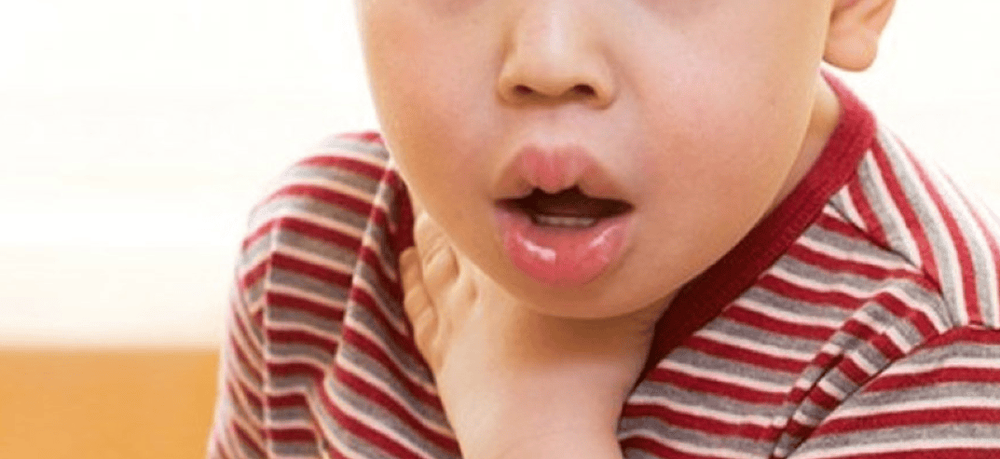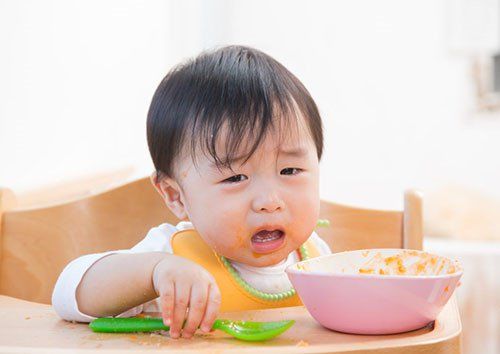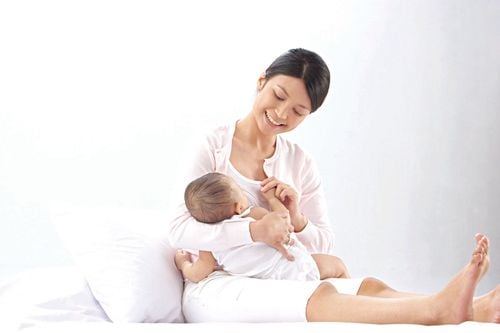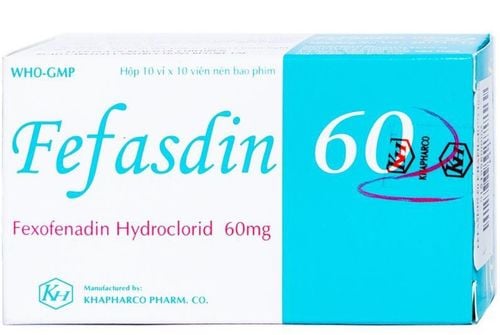This is an automatically translated article.
The article was professionally consulted by resident Doctor Duong Van Sy - Resident Doctor of Pediatrics - Department of Pediatrics - Neonatology - Vinmec Hai Phong International General Hospital. Uncle has 09 years of experience in the field of Pediatrics with strengths in examination, consultation and treatment of diseases in children; Emergency resuscitation, anti-poisoning for infants and children.Respiratory infections in children often appear at the time of season change and recur many times, affecting children's activities and studies. Taking care of children with respiratory infections at home and maintaining a suitable diet will help reverse the disease quickly and avoid unpredictable complications.
1. What is a respiratory infection in children?
The upper respiratory tract includes the following organs: nose, pharynx, pharynx, sinuses, and larynx. These organs have the function of screening and warming the air before it enters the lungs. They are very sensitive to the elements of the surrounding environment, especially bacteria and viruses, so they are easily infected.1.1 Causes of disease
Causes of respiratory infections include: Viruses (Rhino virus, Adeno virus, Parainfluenza virus, Coronavirus, respiratory syncytial virus RSV), bacteria (Haemophilus influenzae, group A hemolytic streptococcus, pneumococcus, a some fungi,...) and favorable factors such as cold weather, season change, young children (under 1 year old), rickets, malnutrition, immunocompromised, after surgery, space narrow living, poor hygiene,...
Inflammatory diseases of the upper respiratory tract include: Rhinitis, pharyngitis, tonsillitis, sinusitis, laryngitis, otitis media,... These diseases can occur either acutely or chronically. If left untreated, upper respiratory infections can turn into lower respiratory tract infections, especially bronchitis and acute pneumonia.
1.2 Symptoms of respiratory infection
Symptoms of respiratory infections include:
Fever: Moderate fever or high fever of 39 - 40 degrees Celsius, mostly continuous fever, possibly convulsions, especially in children under 5 years old; Cough, runny nose, sneezing, fussiness, poor sleep; Shortness of breath due to nasal congestion if the upper respiratory tract is inflamed, or because the bronchi are swollen and constricted if the lower respiratory tract is inflamed (spasmodic bronchitis). Manifestations of dyspnea are rapid breathing, pale lips, bulging nostrils, disturbances in breathing rhythm and number of breaths, concave sternum or concave intercostal spaces. Most children with mild upper respiratory tract infections usually go away on their own within a few days even without antibiotics. However, parents still have to monitor their children's health carefully, if they see that the child has a lot of cough, fatigue, vomiting, cyanosis, fever over 38°C, convulsions, and difficulty breathing, they should immediately take the child to the doctor. for timely treatment and prevention of complications of bronchitis, pneumonia, glomerulonephritis, encephalitis, rheumatic fever,...
The treatment for children with respiratory infections includes drug therapy and non-drug treatment. Treatment with drugs includes: Treatment of symptoms (cough reliever, pain reliever, anti-inflammatory, antipyretic) and root cause treatment (if the cause is caused by bacteria, antibiotics can be used). Non-drug treatment includes cleaning the nose, clearing the airways for the child, maintaining adequate nutrition to increase the body's resistance and creating a fresh and clean living environment for the baby. The treatment of children with antibiotics should strictly follow the doctor's instructions to avoid antibiotic resistance.

Một trong những triệu chứng của trẻ bị viêm đường hô hấp là khó thở
2. How to take care of children with respiratory infections at home
Most cases of children with respiratory infections can be resolved on their own with good care and monitoring. Tasks to do when caring for children with respiratory infections at home include:2.1 Caring for children with fever
Mild fever from 37.5 - 38.5 degrees Celsius: Just give your baby more rest, drink plenty of water, eat easily digestible foods and wear cool clothes. Besides, it is recommended to cool the child with warm water of 37 degrees Celsius and monitor the baby's temperature every 30 minutes; Fever from 38.5 degrees Celsius: It is necessary to give the child fever-reducing medicine as prescribed by the doctor and actively cool the child with warm water of 37 degrees Celsius in places such as armpits and groin. If fever-reducing medicine is used, but the child still has a high fever, you can give the child a warm bath to lower the body temperature quickly and avoid convulsions. At the same time, parents need to check the baby's temperature regularly, every 30 minutes - 1 hour.
2.2 Clearing the airways for children
Hygiene of the nose and mouth: The condition of a lot of runny nose, stuffy nose makes it difficult for the baby to eat and sleep. Therefore, parents can decongest the child's nose by using physiological saline drops into each nostril to dilute the nasal secretions, then use a nasal aspirator to remove the nasal secretions. Finally, use a clean and dry cotton swab to clean the child's nose. In addition, parents can also use a soft, dry tissue to clear the child's nose, avoiding irritation, pain, and redness due to repeated cleaning. Parents should note not to use the mouth to suck the nose for the child because the adult mouth has many bacteria, which can easily be transmitted to the baby. At the same time, avoid overuse of saline to suck the nose because it can cause atrophy of the baby's nasal mucosa. In particular, do not drop garlic juice for children because garlic has a spicy taste, which can cause mucosal burns; Expelling sputum out: Before meals or after eating at least 1 hour, parents can pat their children on the back when they have a cough with sputum to expel sputum from the respiratory tract. The technique is: Bend the hand into a cupped form, keep the thumb pressed against the index finger, pat the baby's back, pat the left side for 3-5 minutes, then switch to the right side for about 3-5 minutes.
2.3 Caring for a child with a cough
Cough can be caused by increased secretion of viscous sputum, increased secretions or by spasms of the respiratory muscles. Depending on the cause, the doctor will prescribe appropriate medication, so parents should not arbitrarily give the child medication. Parents can also relieve cough and sore throat for children by using safe folk remedies such as: suck a little honey every 6 hours, 1⁄2 teaspoons each time; sucking sugar soaked kumquats; Drink diluted - warm tea or use prepared herbs in the form of syrup,...2.4 Caring for children with vomiting
During home care, if parents find that their child has more vomiting symptoms, it is necessary to closely monitor and seek medical attention soon because this may be a sign of thick sputum or a worsening illness. When a child vomits, let the child lie down with his head to the side, clean the vomit in his mouth, throat, and nose and use warm water, a soft towel to dry the vomit on the baby, change the baby's new clothes.
Parents should not arbitrarily give children anti-emetics without a doctor's prescription. If the child has vomiting accompanied by symptoms of dehydration such as sunken eyes, wrinkled skin, lethargy, ... parents should take the child to the doctor immediately.
3. Diet for children with respiratory infections
In the incubation period of respiratory infections, children have fatigue and loss of appetite. When sick, symptoms of sore throat, stuffy nose, combined with long-term use of antibiotics disrupt the intestinal microflora, making children anorexic. Therefore, it is necessary to ensure the right nutrition for children so that they can recover health soon. Some important notes include:
Ensure adequate supply of nutrients for children to improve resistance, help them recover quickly; Feed and breastfeed the child on demand, without excessive abstinence or forcing the child to eat all the prepared food; Children should not eat cold foods, drinks (cold foods make the sore throat more complicated) or foods to which the child is allergic; Should divide into several meals a day with less quantity and softer food, easy to swallow, easy to digest. Green vegetables and fruits can be added to an older child's diet and fruit juices to a younger child's diet; Give your baby enough water to drink as there is a risk of dehydration due to fever and rapid breathing. At the same time, drinking plenty of water also has the effect of soothing the throat and thinning the phlegm; If the baby vomits 1-2 times a day and is still happy and playing normally, just give him food or drink more milk immediately after vomiting so that he does not starve and lose weight.

Trẻ bị bệnh viêm đường hô hấp cần được bổ sung đầy đủ dưỡng chất
4. Measures to prevent respiratory infections in children
Limit children's contact with people suffering from respiratory infections; Avoid factors harmful to children's respiratory tract such as dust, toxic gas, heat,...; Maintain proper hygiene and storage of breast milk to avoid infection; Parents should wash their hands properly before and after caring for children; For children to clean their teeth and gargle daily with salt water; Keep baby's body warm in winter, especially neck, chest, abdomen, hands, soles of feet; Avoid letting children stay in too cold air-conditioned rooms or spend too long outdoors, especially during the changing seasons; Limit taking your baby to crowded places during the epidemic season; Ensure adequate and scientific nutrition: Children's meals should be varied and balanced between 4 groups of substances: carbohydrates, fats, proteins, vitamins and minerals; Hygienic living environment, living room should have good air circulation, avoid secret and humid situation; Fully vaccinated, on schedule to create active immunity to help children prevent many infectious diseases. *Note: During home care, if the baby shows symptoms such as: Inability to drink or breastfeed, worsening illness, difficulty breathing, rapid breathing (over 50 times/minute), chest indrawing, fever continuous high for 3-5 days, severe diarrhea, signs of complications in the lungs, digestive system, ears, eyes, ... parents should take the child to a medical facility immediately for examination, accurate diagnosis and appropriate and effective treatment plan.
In addition, in order to prevent respiratory diseases in children, parents should pay attention to nutrition to improve children's resistance. At the same time, add supporting foods containing lysine, essential micro-minerals and vitamins such as zinc, chromium, selenium, B vitamins,... snacks and less digestive problems.
Parents can learn more:
Why do you need to supplement Lysine for your baby?
The role of zinc - Guidelines for reasonable zinc supplementation
Please visit the website Vinmec.com regularly and update useful information to take care of your baby and family.














